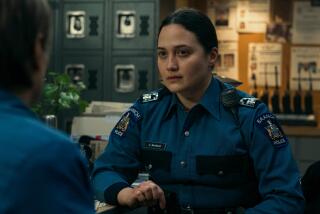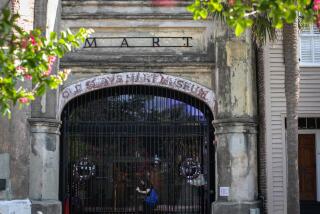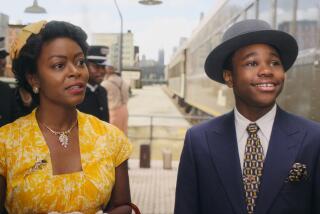‘Ruby Bridges’ Looks at a Hateful World
- Share via
The face of hatred is all the more terrifying when it belongs to someone we might know. To watch “Ruby Bridges,” a story about desegregating New Orleans schools in 1960, is to look unblinkingly into that face--and to weep.
The 6-year-old title character, selected as one of the first African Americans to attend a white school, is escorted by federal marshals each morning past a throng of shouting, fist-waving protesters: clean-cut young men who are red with rage, an ordinary-looking mother who screams that she’s going to hang or poison Ruby, a grandmother who holds an effigy of a black child in a coffin.
Youths can learn a lot from this “Wonderful World of Disney” presentation Sunday on ABC, particularly if parents are ready and willing to discuss it with them afterward. The rest of us would do well to tune in, too. This movie is, at times, very, very difficult to watch, but we all would do well to remember what prejudice can make us capable of--and what overcoming it can achieve.
That’s not to say that watching is a chore. In the best tradition of movie-making, “Ruby Bridges”--which is based on actual events--is an exhilarating tale of strength, perseverance, love and faith.
As written by Toni Ann Johnson and directed by Euzhan Palcy (who made the feature film “A Dry White Season”), it is also blessed with complex and, for the most part, balanced portrayals; even the seemingly good characters tend to have ulterior motives or unacknowledged prejudices.
As Ruby, young Chaz Monet presents a preternaturally calm exterior, which almost--but not quite--masks the many fears racing through her mind.
Her parents are nearly as brave. “She’s just a little girl; how can we put her through that?” her father, played by Michael Beach (“ER”), says at the end of one rough day. Ruby’s mother, played by Lela Rochon (of the feature film “Waiting to Exhale”), firmly replies: “I’m sick of people telling us where we can’t go, what we can’t do, what we ain’t supposed to have. My children are going to have more; they deserve more. And the only way things are going to get better for them is if we make ‘em better.”
Tucking Ruby in for the night, Mom says: “Jesus faced a mob, too, baby. Just like you. And you know what he did? He prayed for them.”
In the days that follow, Dad loses his job (as a Korean War veteran, he feels particularly betrayed); the family is asked to stop shopping at the white-owned grocery store; and even the black neighbors turn on the Bridges because of the protective police roadblocks and other disruptions in everyone’s lives.
Among those reaching across the divide are Ruby’s white teacher (Penelope Ann Miller) and a white psychiatrist (Kevin Pollak) who offers to counsel the girl.
* “Ruby Bridges” airs Sunday at 7 p.m. on ABC. The network has rated it TV-PG-L (may be unsuitable for young children), with an advisory for language.
More to Read
Only good movies
Get the Indie Focus newsletter, Mark Olsen's weekly guide to the world of cinema.
You may occasionally receive promotional content from the Los Angeles Times.











